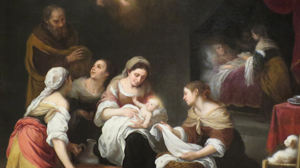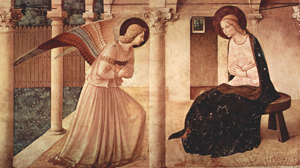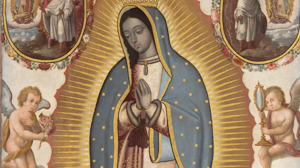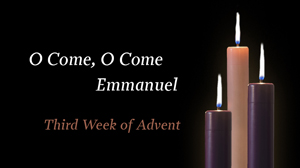Christmas Eve
Scripture:
Isaiah 62:1-5
Acts 13:16-17, 22-25
Matthew 1:1-25 or 1:18-25
Reflection:
Behold, the virgin shall be with child and shall bear a Son, and they shall call His name Immanuel,” which translated means, “God with us.” Matthew 1:26
The other day I was in my room gathering my thoughts for this reflection. My room in the monastery is right next to the entrance of St Agnes Church. As I looked out my window I saw Santa Claus going in to show his respects to Jesus! Christmas is all about the greatest gift that God could possibly ever give us, the gift of His Son. “they shall call His name Immanuel,” We all have a gift beyond our wildest imagination. “The surpassing grace of God is upon you.” 2 Cor 9:14 “Thanks be to God for His indescribable gift!” 2 Cor 9:15 Blessed be the God and Father of our Lord Jesus Christ, who has blessed us in Christ with every spiritual blessing in the heavenly places, Eph 1:3
Job could not understand what God sees in us to be bothered with us. “What is man, that you make so much of him, and that you set your heart on him,” Job 7:17 But set your heart on us You did! When God shared with King Solomon His pleasure at the building of the first temple He promised: “My eyes and My heart will be there perpetually.” 1K 9:3 In other words when people came to the Temple Mont they entered into the loving gaze and very heart of God! What a wonderful place to pray! How much more this is true for us in Jesus. The eyes of God human as well as divine are fixed on us in a loving gaze. His heart full of ever present fondness is there in the face of a Babe.
Jesus talked of His Body being the new temple. “I tell you, something greater than the temple is here.” Mt 12:6 With His Incarnation a startling intimacy with God is offered to us! No wonder Mathew’s Gospel begins and ends with the beautiful word Immanuel! When Jesus comes to us in our humanity He comes to us in an incredible friendly and gentle way. Now God has a human face, a Thou, someone who palpably is “God with us”. Christ takes on a closeness and intimacy that the world of the First Testament could not imagine much less grasp!
Fr. Bob Weiss, C.P. preaches Parish Missions and is a member of the Passionist Community in Louisville, Kentucky.







